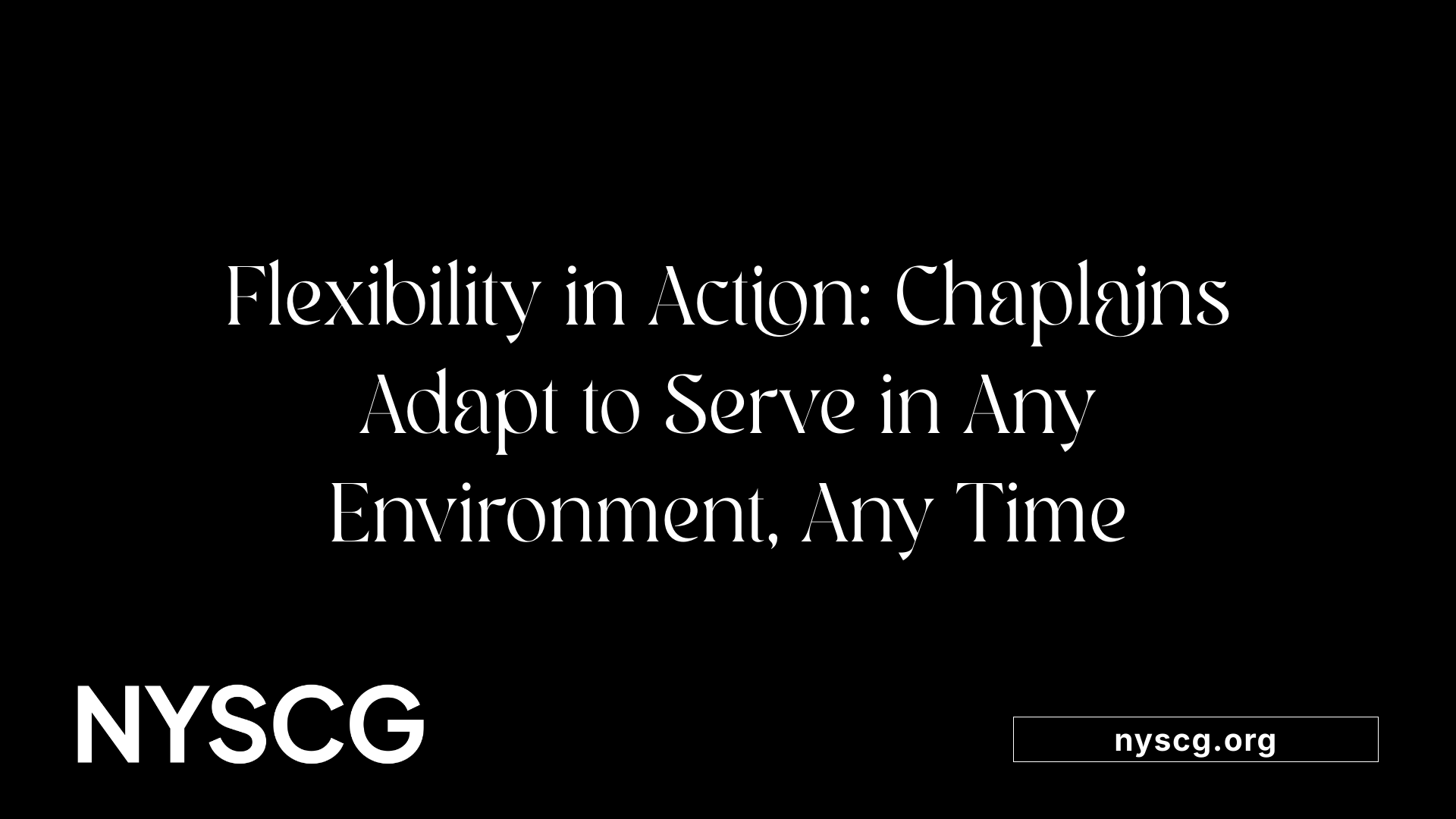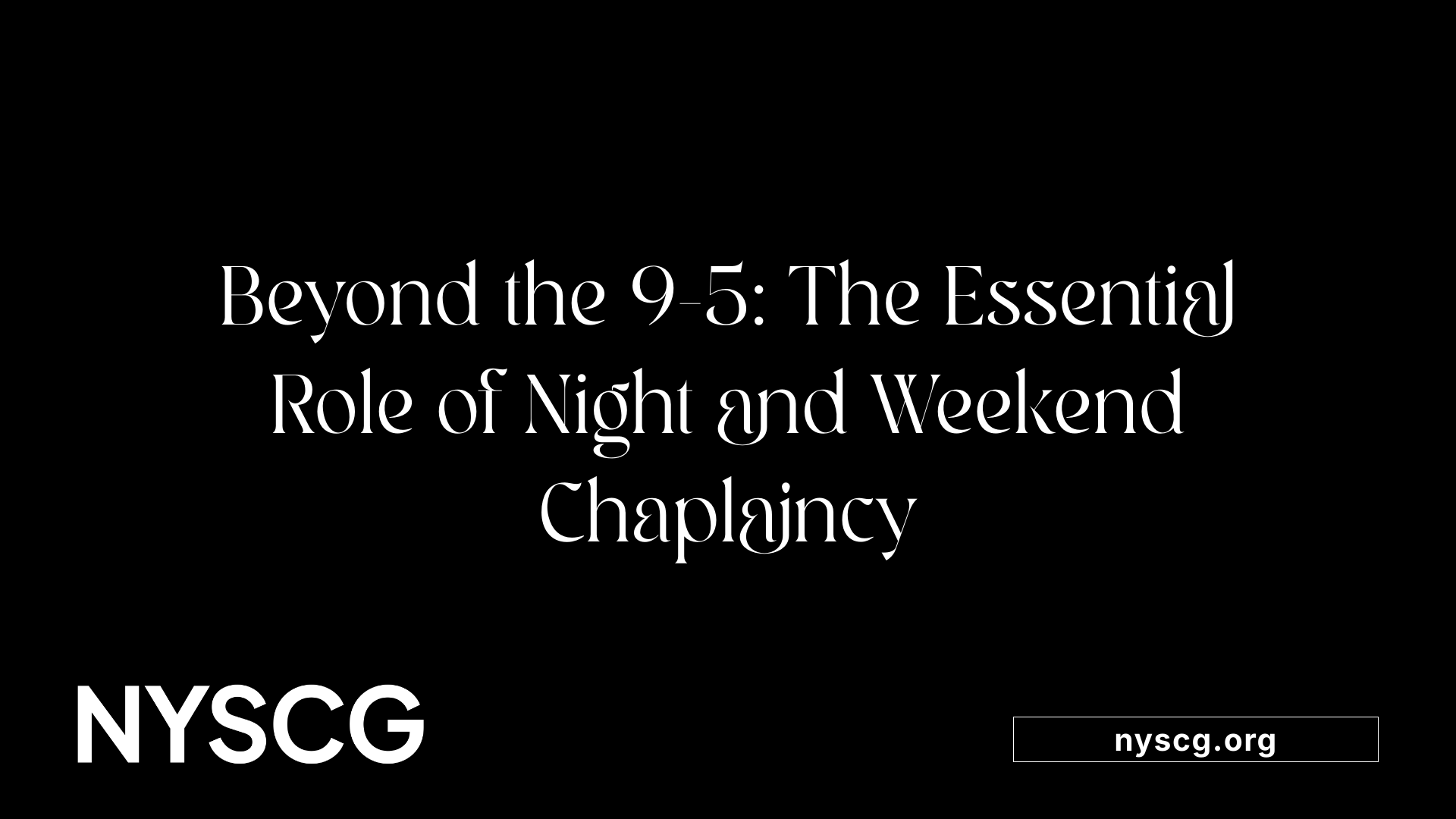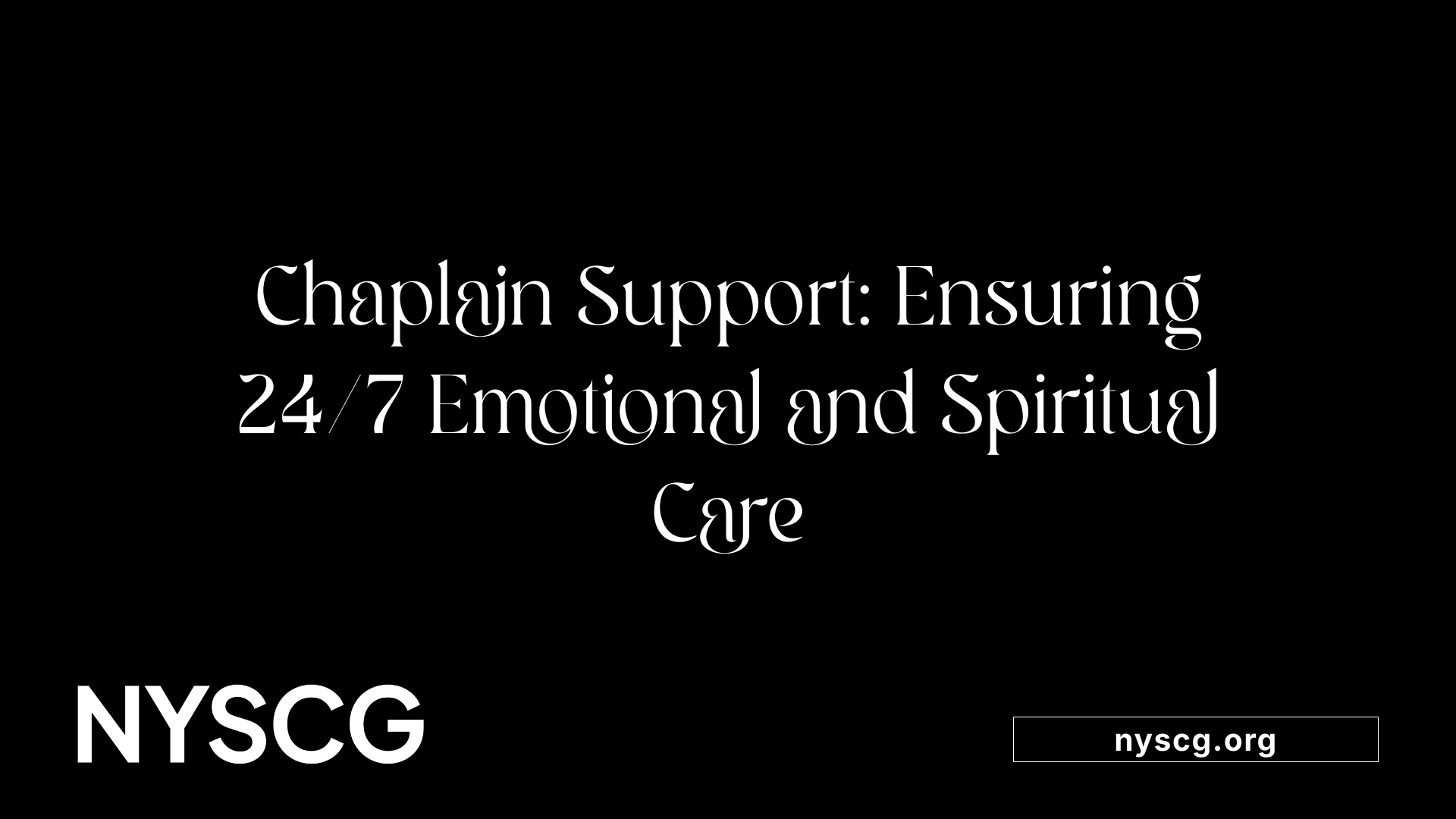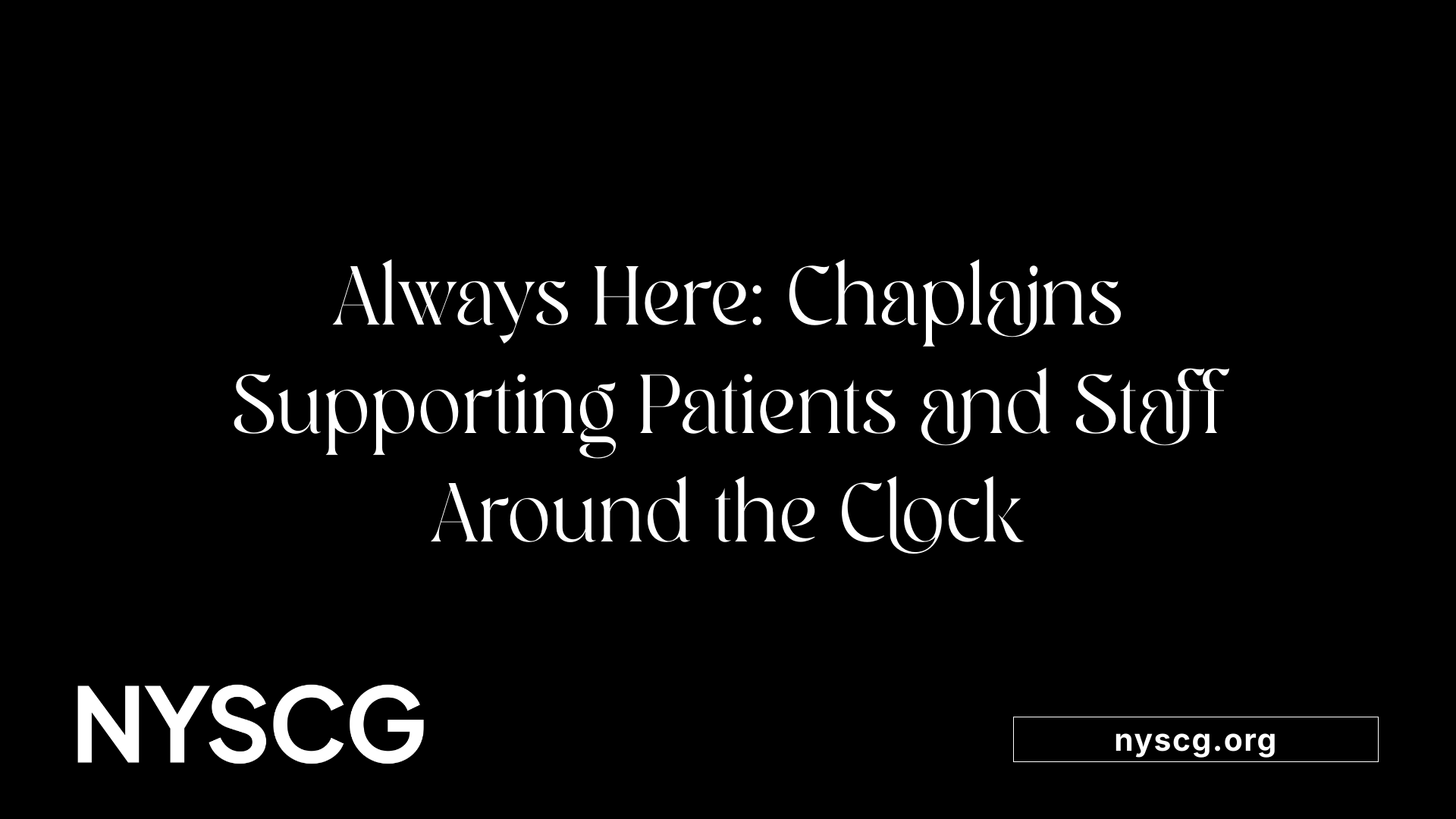Do Chaplains Work Nights and Weekends?


Chaplains serve a crucial function in providing spiritual and emotional support across a variety of settings, notably in hospitals, military, community organizations, and correctional facilities. Their role often extends beyond traditional working hours, requiring flexibility to meet urgent needs during nights, weekends, and holidays. This article explores whether chaplains work nights and weekends, how their work schedules are structured, and the significance of their availability outside standard hours.

Chaplains serve in various environments, and their work hours often reflect the needs of those settings. In healthcare facilities such as hospitals, chaplains usually work full-time, with shifts extending beyond traditional daytime hours. They are often on-call during nights, weekends, and holidays to provide continuous spiritual support for patients, families, and staff.
Hospital chaplains might work evening, night, and weekend shifts, especially in roles that require on-call coverage. They are prepared to respond rapidly to urgent situations like medical crises, end-of-life moments, or grief. Such schedules often include night shifts from late evening through early morning, and rotating weekend duties to ensure no moment is left without spiritual care.
In community organizations, chaplains may work part-time or on a flexible schedule to accommodate community activities, educational programs, and crisis response. Their hours can vary widely, often including evening or weekend commitments.
Chaplains in correctional facilities, military bases, and hospice settings also exemplify this adaptability. These roles often demand irregular hours to meet the 24/7 needs of the populations served. For example, correctional chaplains work shifts that cover overnight and weekend hours, ensuring inmates receive ongoing emotional and spiritual support.
Overall, chaplains must be highly adaptable, ready to work during nights, weekends, and holidays. Their schedules are designed around the continuous nature of care needs in hospitals, correctional facilities, military environments, and community outreach programs. Such flexibility helps maintain comprehensive support when most needed, ensuring no individual faces hardship alone.

Chaplain roles often extend beyond typical daytime hours to meet the urgent and ongoing spiritual needs of those they serve. They are expected to be on-call and readily available during nights, weekends, and holidays. In hospitals and other community settings, this means responding swiftly to crises, such as patient emergencies or emotional distress, regardless of the hour. For example, hospital chaplains provide crisis intervention, support during diagnoses or end-of-life situations, and offer guidance to both patients and staff during these critical moments.
Supporting staff and emergency responders is also a vital part of their work. They may offer counseling, conflict resolution, and stress relief—helping those on the front lines cope effectively. Whether conducting religious rites, leading grief sessions, or participating in community events, chaplains aim to maintain a continuous presence of compassionate spiritual care during times when it is needed most. Their work outside regular hours plays a crucial role in creating a supportive, resilient environment for all involved.
To ensure around-the-clock support, chaplain schedules are carefully arranged to include night, weekend, and holiday shifts. Most organizations utilize rotating schedules or on-call systems to achieve consistent coverage. Many hospitals, for instance, have chaplains on-site or on-call during nights and weekends, ready to respond to emergencies swiftly.
On-call arrangements often involve specific shifts, such as overnight hours from late evening into the morning, or designated weekend days, with some positions requiring availability from early mornings through late nights. These schedules are designed to be flexible, allowing chaplains to adapt to unpredictable needs, including crisis situations or last-minute spiritual support requests.
By sharing coverage among team members, organizations can provide continuous emotional and spiritual care. This not only benefits patients and families during emergencies but also supports staff wellbeing by offering timely emotional support during stressful or difficult times.
| Location | Typical Shift Hours | Coverage Details | Additional Notes |
|---|---|---|---|
| General hospitals | Nights, weekends, holidays | Call-in or on-site shifts | Rotating schedules; 24/7 availability |
| Mayo Clinic | Thursday to Saturday, 9:45 pm to 8:15 am | On-call overnight coverage | Part of a flexible team setup |
| Brown University Hospitals | Weekdays 8 am - 4:30 pm / Nights and weekends on-call | Availability for emergencies | Includes outpatient and bedside visits |
| Mercy Hospitals | Night shifts, weekends, on-call | Regular sharing of night/weekend shifts | Emergency ICU rounding |
In conclusion, chaplains’ work hours are intentionally flexible and designed to ensure continuous support for those in need. Whether during emergencies, daily rituals, or routine spiritual care, their presence outside standard hours is vital for fostering a compassionate, resilient healthcare environment.
 Are chaplains available during non-standard hours?
Are chaplains available during non-standard hours?
Yes, chaplains routinely provide support during non-traditional hours across various settings. In hospitals, chaplains are often on-call around the clock, including nights, weekends, and holidays, to respond swiftly to urgent needs. Many healthcare institutions maintain formal on-call systems allowing chaplains to be reachable outside of regular working hours, ensuring that patients, families, and staff can access spiritual and emotional support whenever necessary.
Hospitals such as Aurora BayCare Medical Center, Aurora Sinai Medical Center, and others have established protocols for on-call chaplain coverage. These chaplains are equipped to respond to emergencies, perform rites, and offer comfort during critical moments at any time of day or night. In addition, hospital chapels and meditation rooms are typically open 24/7, providing a quiet space for reflection and spiritual needs.
What role do chaplains play in providing spiritual support outside regular hours?
Chaplains are integral in offering continuous spiritual care outside of standard hours through organized on-call rotations and flexible scheduling. They respond promptly to crises, such as sudden illness, trauma, or death, often working when most needed. Their services include conducting bedside prayers, administering sacraments, leading memorial services, and providing grief counseling.
Beyond hospitals, chaplains in military, correctional, or community environments also work nights and weekends, attending to individuals during emergencies or times of distress. During exceptional periods like the COVID-19 pandemic, chaplains adapted by offering virtual services, livestreams, and contactless rites to continue supporting their communities.
This around-the-clock availability ensures that emotional and spiritual needs are addressed promptly, fostering resilience, hope, and care whenever they are most urgent. Overall, the commitment of chaplains to be accessible outside regular hours highlights their dedication to compassionate, holistic support.

Yes, chaplains do work nights and weekends. Hospital chaplains at institutions like OHSU have scheduled weekend shifts, such as from 8:00 a.m. to 6:30 p.m. on Saturdays and Sundays. They also participate in on-call rotations during evenings, nights, weekends, and holidays.
Their responsibilities include responding to urgent and emergency requests outside normal hours, highlighting that after-hours work is essential to their role. This flexibility allows them to provide crucial support during crises, emergencies, and end-of-life situations which often occur outside standard daytime schedules.
Overall, working nights and weekends is an integral part of a chaplain's duties, enabling continuous spiritual and emotional support for patients, families, and staff whenever it is needed.
In summary, chaplains are integral to providing continuous, around-the-clock spiritual and emotional care in various settings. Their work includes scheduled shifts during nights and weekends, on-call duties, and emergency response to ensure that individuals facing crises, grief, or personal struggles have access to support whenever they need it. The nature of their work embraces flexibility, resilience, and a commitment to serve regardless of the hour. As healthcare and community needs evolve, the role of chaplains remains vital in maintaining a compassionate environment that prioritizes spiritual well-being at all times.
All you need is the will to make the world a better place.
New York State chaplain group inc. is a tax deductible organization with a federal tax Id number 92-383-4921